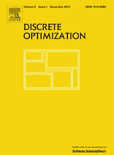
Discrete Optimization
Scope & Guideline
Driving Excellence in Applied Mathematics and Computational Theory
Introduction
Aims and Scopes
- Discrete Mathematical Optimization:
The journal emphasizes research that involves combinatorial optimization, where the objective is to optimize a function over discrete structures such as graphs, sets, and networks. - Algorithm Development:
There is a strong focus on the development and analysis of algorithms for solving discrete optimization problems, including approximation algorithms, heuristics, and exact algorithms. - Polyhedral Theory and Integer Programming:
Research that explores the geometry of polytopes and integer programming formulations is a core area, often contributing to tighter bounds and new inequalities. - Real-World Applications:
The journal publishes studies that apply discrete optimization techniques to practical problems in fields such as logistics, telecommunications, and operations research. - Interdisciplinary Approaches:
It encourages interdisciplinary research that integrates concepts from computer science, operations research, and applied mathematics, particularly in the context of optimization.
Trending and Emerging
- Complex Network Optimization:
Recent publications have increasingly addressed optimization problems within complex networks, highlighting the importance of understanding interactions in interconnected systems. - Machine Learning Integration:
The integration of machine learning techniques with optimization algorithms is on the rise, particularly in developing adaptive algorithms that leverage data-driven insights. - Multi-Objective and Pareto Optimization:
There is a growing trend towards research that involves multi-objective optimization, where trade-offs between competing objectives are analyzed, reflecting real-world complexities. - Stochastic and Robust Optimization:
Research focusing on stochastic and robust optimization has gained traction, as it addresses uncertainty in data and models, which is crucial for practical applications. - Dynamic and Online Optimization:
The emergence of dynamic and online optimization problems reflects the necessity for solutions that adapt to changing conditions in real-time scenarios.
Declining or Waning
- Classical Graph Theory Problems:
Research specifically targeting classical graph theory problems, such as basic graph coloring and matching, appears to be less frequent, potentially as the field matures and researchers seek more complex or novel problems. - Basic Integer Programming Techniques:
There has been a noticeable decrease in publications centered around traditional integer programming techniques without novel contributions, as the community increasingly seeks innovative methodologies. - Single-Objective Optimization:
The focus on single-objective optimization problems has waned, possibly as researchers pivot towards multi-objective optimization and more complex decision-making scenarios. - Static Problem Formulations:
There is a decline in the exploration of static optimization problems, with a growing preference for dynamic or adaptive models that better reflect real-world scenarios. - Traditional Heuristic Approaches:
While heuristic methods remain important, the journal has seen a reduction in the publication of basic heuristic techniques, favoring more advanced and hybrid approaches.
Similar Journals
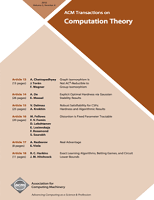
ACM Transactions on Computation Theory
Driving Innovation in Computational Theory and Mathematics.ACM Transactions on Computation Theory, published by the Association for Computing Machinery, is a prestigious journal dedicated to advancing the field of computation theory and theoretical computer science. With an ISSN of 1942-3454 and an E-ISSN of 1942-3462, this journal serves as a vital resource for researchers and professionals seeking to explore groundbreaking developments in computational models, algorithms, and their mathematical foundations. The journal's rigorous standards have earned it a significant position within the academic community, as evidenced by its 2023 category quartiles, ranking in the Q1 category for Computational Theory and Mathematics and Q2 for Theoretical Computer Science. Although it operates through traditional subscription access, it maintains a critical role in disseminating cutting-edge research and fostering collaboration among experts in the United States and beyond. As an influential platform, ACM Transactions on Computation Theory is committed to contributing to the ongoing dialogue and advancement of computation theory, making it essential reading for anyone passionate about this dynamic field.
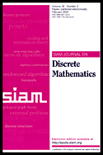
SIAM JOURNAL ON DISCRETE MATHEMATICS
Innovating solutions in graph theory and algorithm design.SIAM Journal on Discrete Mathematics is a premier academic journal dedicated to the publication of high-quality research in the field of discrete mathematics. Published by SIAM Publications, this journal features original research articles covering a broad range of topics, including combinatorial optimization, graph theory, and algorithm design. With an impressive impact factor placing it in the top quartile (Q1) of mathematics journals, it is a valuable resource for researchers and practitioners looking to stay abreast of the latest advancements in discrete mathematics. Although currently not open access, the journal commits to disseminating rigorous and impactful findings that advance the understanding of mathematical concepts and their applications in various scientific domains. Renowned for its rigorous peer-review process, the SIAM Journal on Discrete Mathematics serves as an essential platform for scholars aiming to contribute to this evolving field, making it a must-read for anyone involved in mathematical research.
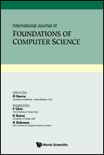
INTERNATIONAL JOURNAL OF FOUNDATIONS OF COMPUTER SCIENCE
Fostering Knowledge in Computational MethodologiesThe International Journal of Foundations of Computer Science, published by World Scientific Publishing Co Pte Ltd, is a premier repository for cutting-edge research in the field of computer science, emphasizing foundational theories and methodologies. With an ISSN of 0129-0541 and an E-ISSN of 1793-6373, this journal has established itself as a valuable resource since its inception in 2000, continuously contributing to scholarly discourse up to the present year, 2024. It is ranked in the Q2 quartile of computer science categories, indicating its notable impact and relevance within the academic community, particularly in miscellaneous subsections of the field. While it does not currently offer open access options, it remains a crucial platform for researchers, professionals, and students seeking to deepen their understanding of computational foundations, algorithms, and theoretical frameworks. The journal encourages submissions that push the boundaries of knowledge and invites innovative approaches that address contemporary challenges in computer science.

JOURNAL OF COMBINATORIAL OPTIMIZATION
Bridging theory and application in combinatorial studies.JOURNAL OF COMBINATORIAL OPTIMIZATION, published by Springer, stands at the forefront of research in the fields of applied mathematics, computational theory, and combinatorial optimization. With an ISSN of 1382-6905 and E-ISSN of 1573-2886, this esteemed journal serves as a vital platform for groundbreaking studies and methodologies from 1997 to 2024. Notably positioned in the Q3 quartile across several categories, including applied mathematics and discrete mathematics, it reflects a commitment to high-quality research that pushes the boundaries of knowledge in quantitative analysis and algorithm development. Although it does not offer open access, its visibility and impact are underscored by impressive Scopus rankings, such as the 67th percentile in discrete mathematics and combinatorics. The journal aims to foster a comprehensive understanding of combinatorial optimization and its applications, making it an indispensable resource for researchers, professionals, and students eager to stay abreast of the latest trends and advancements in these dynamic disciplines.

CONSTRAINTS
Advancing Insights in Computational Theory and Discrete MathematicsCONSTRAINTS, an esteemed journal published by Springer, specializes in the interrelated domains of Artificial Intelligence, Computational Theory and Mathematics, Discrete Mathematics and Combinatorics, and Software. With an ISSN of 1383-7133 and E-ISSN of 1572-9354, this journal provides a critical platform for disseminating cutting-edge research and methodologies aimed at addressing complex challenges in these rapidly evolving fields. Located in the Netherlands, the journal's rigorous selection process is reflected in its impressive categorizations, achieving Q2 and Q3 rankings in various Scopus categories for 2023. This positions it among the top quartiles in its respective fields, making it a vital resource for scholars and practitioners seeking to stay at the forefront of innovation. Researchers and students alike will benefit from the insightful contributions within its pages, making CONSTRAINTS a pivotal journal for those dedicated to advancing knowledge and application in computational and artificial intelligence spheres.

Discrete Mathematics Letters
Empowering research through open-access knowledge.Discrete Mathematics Letters is a prominent open-access journal dedicated to advancing the field of Discrete Mathematics and Combinatorics, published by Shahin Digital Publisher. Since its inception in 2019, this journal has rapidly established its presence in the academic community, securing a respectable Q2 category ranking in the 2023 Scopus database, positioning itself at rank #45 out of 92 in its field, making it a valuable resource for researchers and practitioners alike. With a commitment to disseminating high-quality research, Discrete Mathematics Letters provides an accessible medium for sharing innovative ideas and findings within the mathematical sciences, ensuring that researchers, students, and professionals stay informed about the latest developments. As an open-access journal, it provides free access to publications, fostering collaboration and knowledge exchange among the global research community.

DISCRETE & COMPUTATIONAL GEOMETRY
Bridging Theory and Application in GeometryDISCRETE & COMPUTATIONAL GEOMETRY is a prestigious journal published by Springer, specializing in the fields of computational geometry, discrete mathematics, and theoretical computer science. With its ISSN 0179-5376 and E-ISSN 1432-0444, this journal has established itself as a key resource for researchers and professionals, offering a platform for the dissemination of high-quality research from 1986 to 2024. Recognized for its impact in the academic community, it currently holds a Q2 ranking in several important categories, including Computational Theory and Mathematics, Discrete Mathematics and Combinatorics, Geometry and Topology, and Theoretical Computer Science. Although it is not an open-access journal, the rigorous peer-review process ensures that published articles meet the highest standards of scientific integrity and scholarship. With Scopus rankings reflecting its influence—placing it in the 72nd percentile for Geometry and Topology and 62nd for Discrete Mathematics—it serves as an essential reference for students and scholars seeking to deepen their understanding of complex geometric and combinatorial theories.

DISCRETE MATHEMATICS AND THEORETICAL COMPUTER SCIENCE
Pioneering Insights in Discrete Mathematics and Theoretical ComputingDISCRETE MATHEMATICS AND THEORETICAL COMPUTER SCIENCE, published by DISCRETE MATHEMATICS THEORETICAL COMPUTER SCIENCE in France, stands as a significant open-access journal since 1997, publishing innovative research articles within the intersecting disciplines of discrete mathematics and theoretical computer science. With an ISSN of 1462-7264 and an E-ISSN of 1365-8050, this journal aims to provide a platform for scholarly discourse and dissemination of knowledge, making it accessible to a global audience. It is recognized for its contributions, achieving a Q2 ranking in both Computer Science (Miscellaneous) and Discrete Mathematics and Combinatorics, alongside a Q3 ranking in Theoretical Computer Science as of 2023. The journal’s rigorous selection process ensures that only high-quality research is published, promoting advancements in these critical areas of study. Researchers, professionals, and students alike can benefit from its comprehensive articles that not only enhance theoretical understanding but also foster practical applications in the ever-evolving landscape of computer science.
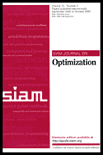
SIAM JOURNAL ON OPTIMIZATION
Exploring the depths of theoretical computer science.SIAM Journal on Optimization is a prestigious academic journal published by SIAM Publications, dedicated to advancing the field of optimization within applied mathematics, theoretical computer science, and software. Since its inception in 1991, the journal has maintained a rigorous commitment to publishing high-quality research that drives innovation and application in optimization theory and methodology. With a significant impact factor and currently ranking in the Q1 quartile across various academic categories, the journal serves as an essential platform for researchers, professionals, and students aiming to contribute to this dynamic field. Although it does not currently offer open access, the journal's robust reputation and extensive reach make it an invaluable resource for those looking to stay at the forefront of optimization research. Based in Philadelphia, PA, this journal plays a crucial role in disseminating pivotal findings that enhance both theoretical understanding and practical applications of optimization in diverse domains.
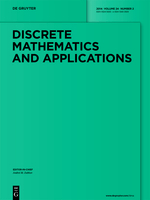
Discrete Mathematics and Applications
Bridging Theory and Practice in Mathematical Sciences.Discrete Mathematics and Applications, published by WALTER DE GRUYTER GMBH, is a vital academic journal catering to the expansive fields of Discrete Mathematics and Applied Mathematics. With an ISSN of 0924-9265 and an E-ISSN of 1569-3929, it serves as a reputable platform for disseminating innovative research and developments within these domains. The journal has been contributing to the academic landscape since its inception in 1991 and continues to actively publish impactful studies through 2024. Despite its current positioning in Q4 of both the Applied Mathematics and Discrete Mathematics and Combinatorics categories, the journal is dedicated to fostering essential discussions that advance understanding and application of discrete mathematical concepts. It provides researchers, professionals, and students with access to a wealth of knowledge, encouraging collaboration and growth within the field. With its strategic German headquarters in Berlin and a focused aim to enhance the visibility and significance of discrete mathematics in real-world applications, Discrete Mathematics and Applications stands out as an important resource for those seeking to contribute to the ongoing evolution of mathematical sciences.